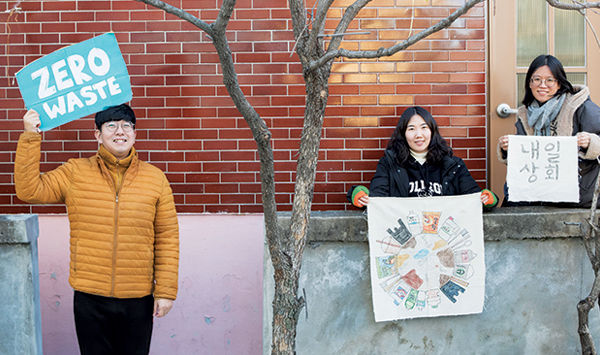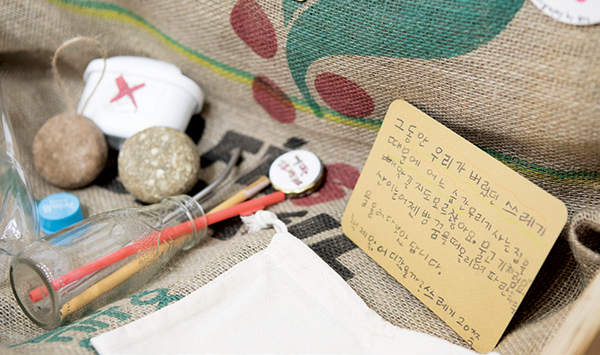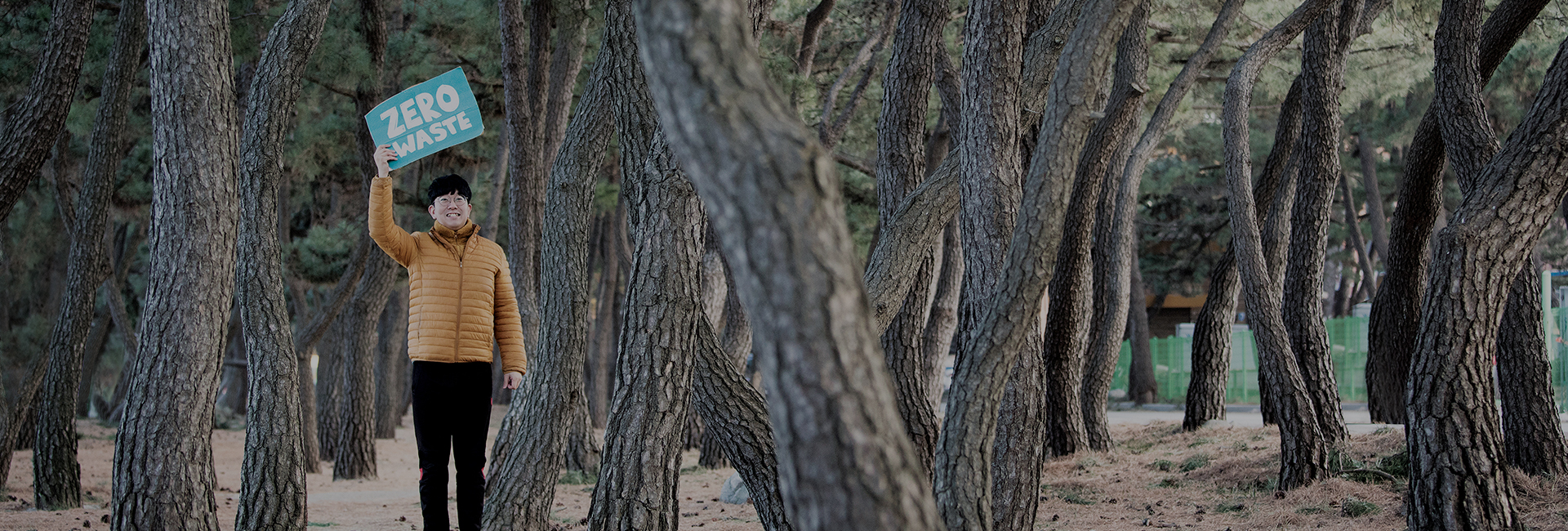
- Water, Nature and Humankind
- Natural Meeting
-
Ji Hyeon-tak, President of
the Ecologically Transformed
Villages Tomorrow
Cooperative, an
environmental activist group
in Gangneung- Written by. Choi Hang-jwa
- Photo by. Kim Beom-ki
- If you are looking for a trendy zero waste store in Gangneung, ‘Tomorrow Store” is where it’s at. The store sells natural detergents & soaps, toothbrushes, tumblers and eco bags, and also endorses different options of living an eco-friendly lifestyle. If we observe and pay attention to Ji Hyeon-tak’s everyday life as he tries to make zero waste for a healthier Earth, we may be find real answers to some of the environmental challenges facing us today.
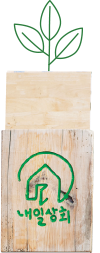
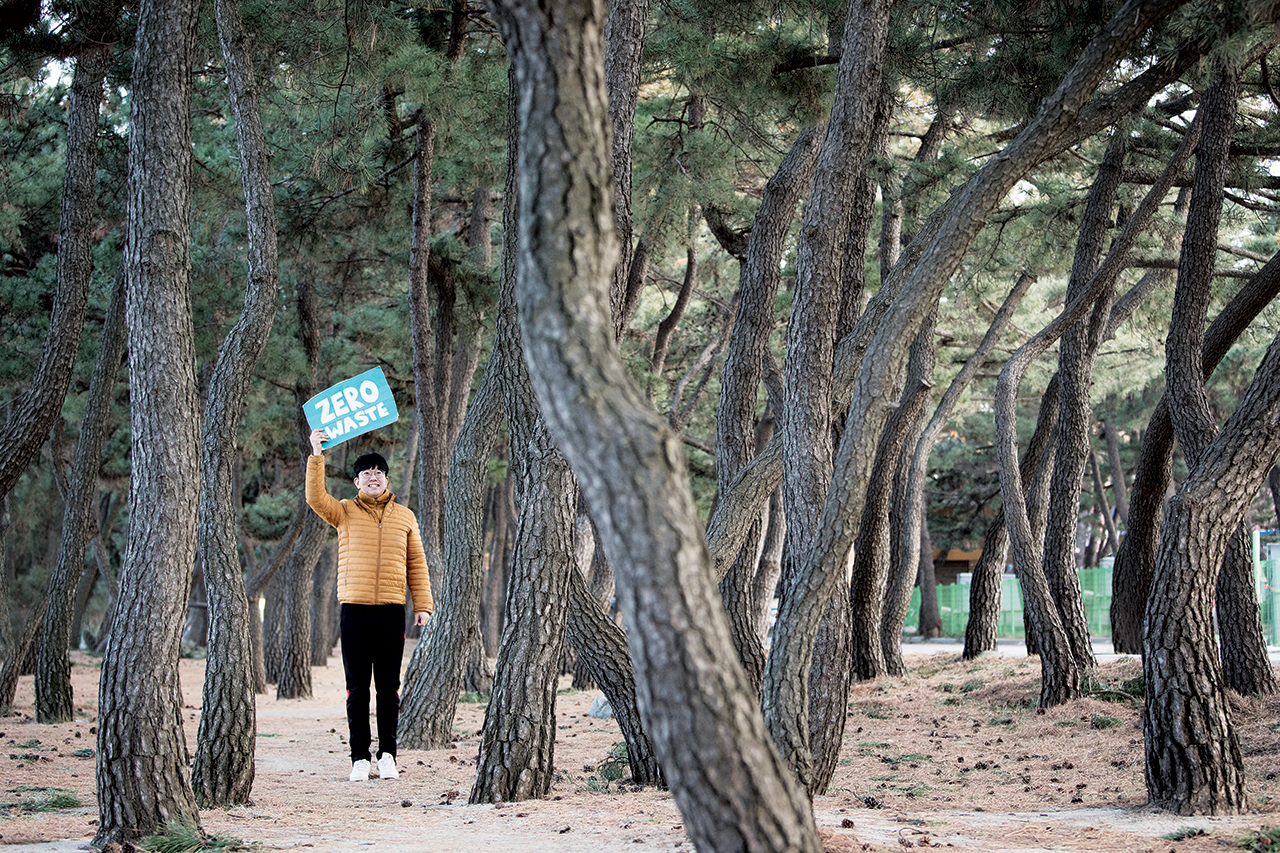
Living in beautiful Gangneung
“I’ve been living in Gangneung for over ten years. We as friends of Gangneung wanted to do something meaningful here in Gangneung. I suggested that we find things we can do and create a community. That’s how my life in Gangneung began.”
He entered a college in Gangneung at the age of 20, and that is how his first connection to Gangneung started. He thought he would go back to Seoul after graduation. The more he learned about Gangneung, however, the more fascinated he became with the city. In spring, cherry blossoms paint the entire area of Gyeongpo Lake pink; in summer, people are drawn to the beaches to see white waves come crashing to the shore. Fall is the perfect season for camping in pine tree forests full of phytoncide, and when winter comes, the beaches turn down their voices and start to whisper. He couldn’t just leave behind all these sights and sounds of Gangneung, so he decided to stay a little longer there.
When he started to grow a small vegetable garden, his life was forever changed; Gangneung became the place where he would spend the rest of his life. Since he had always been interested in healthy eating, he decided to join the vegetable garden-growing program organized by a local environmental group. Back then, he had no idea how this would change his life because it was just for fun. It all started out of simple curiosity, but it inevitably led him to become interested in environmental issues.
His passion for doing something meaningful with others continued to grow; he formed a book club, initially for the simple purpose of staying in touch with his friends and neighbors.
Over time, people started to come to him saying, “I’m interested, too, and I want to join the book club.”
“When I met people with whom I was able to share my ideas, I felt so happy and relieved. And I thought it would be meaningful to work with more people in responding to ecological and environmental issues. I believed all the small steps could add up and eventually lead to bigger changes. I couldn’t have done it without them, who share the same values.”
Tomorrow Store, the first zero waste store in Gangneung
Ji says that it is not easy at all for young people to work together for a cause in Gangneung. It is hard to find people who share the same interests, tastes, or ideas in a small city like Gangneung, unlike big cities such as Seoul. Moreover, there are few spaces available in Gangneung where those people can get together. But as the saying goes, “Where there’s a will, there’s a way”; his passion for creating a community to resolve ecological and environmental issues in Gangneung and implementing fun projects for the same cause led him to the path of an environmental activist.
He thought his life as an environmental activist would be more fun and happier, so he opened Tomorrow Store in 2019, which marks the beginning of his new life as an activist.
A small house in Ponam-dong was remodeled into Tomorrow Store. On the outside, it doesn’t look like a commercial store, and you can’t tell for sure if it is open or not. You can easily miss it if you don’t look carefully. The sign standing in front of the gate lets you know it is Tomorrow Store.
Tomorrow Store is the first store in Gangneung where zero-waste products are displayed and sold. “Zero waste” refers to the lifestyle of protecting the environment by reducing packaging and using recyclable or reusable materials to reduce waste. The store sells more than 40 household items that can replace items made of plastic—a material that is consumed and thrown away the most in everyday life—natural detergents, soaps, and soap nuts in small portions. Each of the products comes with a handwritten, informational note instead of over-packaging. Practicing “zero waste” on a daily basis inevitably entails inconvenience because it means you have to abandon all your life-long daily habits. But he says it does not necessarily mean that implementing zero waste is a difficult task. If you can find an eco-friendly alternative to just one of your daily items and stick to it, that is enough. For example, you can replace a plastic toothbrush with a bamboo brush,
disposable plastic bags with cloth bags, and chemical dishwashing liquids with soap nuts. In particular, soap nuts, a type of tree nuts with seed cases rich in saponin—a natural surface active agent—can be used to wash dishes and food ingredients as well. There are many ways to implement zero waste. He suggests we choose only one of them and stick to it.

I am so thankful to K-water for implementing
multiple projects in response to climate change
and ensuring the safety of the tap water used
every day. If it’s K-water that’s planning water-
related projects in which citizens can participate,
I’m definitely all for it.

Prepare for Gangneung’s Future
As a young activist constantly looking for sustainable ways of life in Gangneung, Ji is actively involved in a wide range of activities to preserve Gangneung’s ecological environment in response to climate change. One of such activities is running Modu School dedicated to educating people on how to practice environment-friendliness. Last year, the school offered environmental education to students in elementary, middle, and high schools. The education program focused on providing hands-on experiences— rather than teaching theories—that can change everyday life such as making eco-friendly shampoos and recycling waste, and it was well-received by students.
“I was surprised to find out that young students are quite interested in climate crises. When students told me that the education was fun and useful, I felt rewarded. The education program also gave me positive energy, and it remains a special memory to this day. Going forward, I want to continue with this education program if I can.”
Ji is also involved in plogging together with other citizens. They pick up trash at rivers and beaches and protect both their health and the environment. In addition, they collect milk packs and send them to paper companies and gather used filters from water purifiers to send back to their manufacturers. All these efforts are made in the hope that the waste can be recycled. “It’s no longer their problem. It is now our problem. Mountains and beaches in Gangneung are disappearing. This year, I want to create a network of ‘Friends of Tomorrow’ working in different fields to preserve the ecological environment of Gangneung. Preserving the beautiful nature of Gangneung and making Gangneung a place where people want to live— this is my dream for Gangneung.”
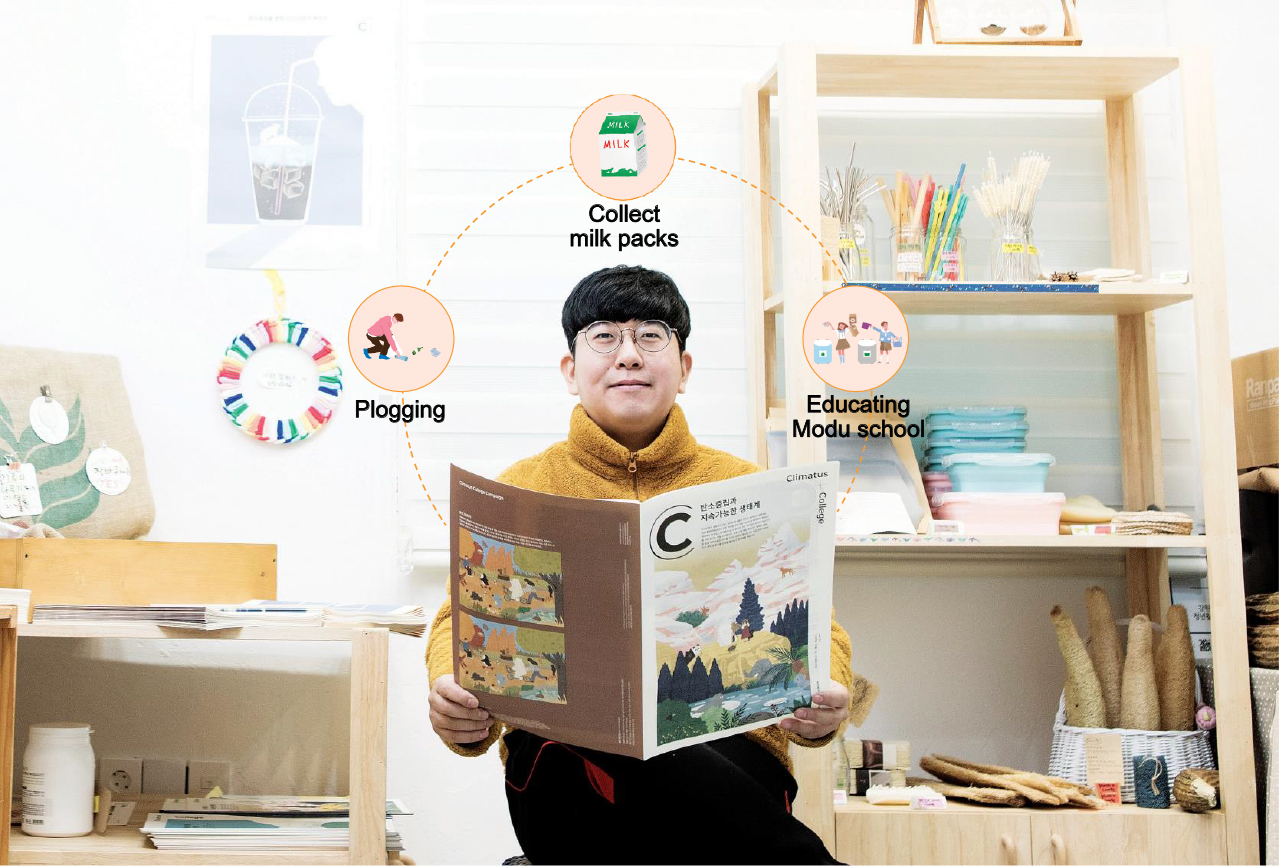 ※ This coverage was conducted safely in compliance with the COVID-19 quarantine rules.
※ This coverage was conducted safely in compliance with the COVID-19 quarantine rules.

Tomorrow Store
The store is a zero waste store selling various products that can help people in Gangneung make eco-friendly choices for the future in response to climate change. It is also a place where like-minded citizens can gather together to share ideas and learn more. The store is run by the Ecologically Transformed Villages Tomorrow Cooperative. Address: 25-1, 96 bun-gil, Yongji-ro, Gangneung, Gangwon-do
